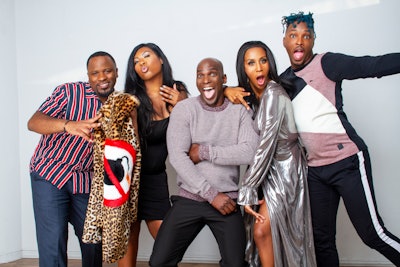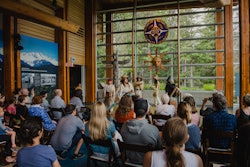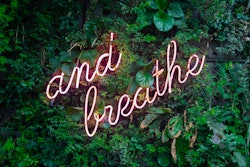
February can be a reflective time at the beginning of the year where we honor the leaders who came before us and consider the progress left to make. Unfortunately, toothless affairs can make it feel like one fleeting acknowledgement after another, especially when they come amid a backdrop of police brutality and casual racism.
Panels convene Black professionals for once-a-year talks about the importance of inclusion. Companies launch targeted ads quickly assembled in the weeks prior. C-suites take a cursory glance at their diversity numbers and promise to do better.
The truth is, Black-owned brands are looking for reliable venues and partners year-round. Black event planners juggle everything—from small weddings to huge corporate getaways—all 12 months. And Black executives representing venues are host to all kinds of businesses—from the niche to the mainstream—day after day.
Embracing their perspectives, whether you’re hiring staff for an event or deciding where to have one, is not only moral, but lucrative. Building a bridge to any marginalized community (especially in this majority-white industry) can lead to partnerships that last a lifetime. After all, people remember who was there for them.
“I’m black 365 days a year,” says Sandi Robinson, the director of sales and marketing for The Godfrey Hotel Chicago. “It all ties back to having a presence and representation year-round.”
For tips on how to do that, BizBash spoke to five Black event professionals on how to extend the spirit of Black History Month beyond the shortest month of the year...
 Tamuel Cowart, the president of RW Brands in Winter Springs, Fla.Photo: Courtesy of Tamuel Cowart
Tamuel Cowart, the president of RW Brands in Winter Springs, Fla.Photo: Courtesy of Tamuel Cowart
Tamuel Cowart is the president of RW Brands in Winter Springs, Fla. She owns a venue, manages another, and runs a separate business loaning out a curated collection of chairs, tables, and bar tops across Central Florida. But Black professionals like her still face a range of unfair assumptions.
“[That] we may not show up on time. The quality of our products may not be as good. We won’t show up dressed professionally. We’re just not good enough,” she says. “All of those things are the complete opposite of our team.”
And even if you get in the room, you might realize you’re the only Black person there.
Melva LaJoy Legrand, founder of D.C.-based events firm LaJoy Plans, remembers the burden of having to “speak for all Black people” early in her career.
“It felt heavy. You feel like you are the standard, so if you make a mistake there’s no grace in that environment. You have to almost be this perfect representative of the race,” she says.
Taking away this responsibility by hiring more Black professionals not only guarantees a wider perspective when making decisions, but it also frees existing Black employees from the weight of an impossible task, thereby unlocking their creative potential
 Lori Hall, the co-founder of Atlanta-based, Black-owned, and women-led multicultural marketing agency Pop'N Creative.Photo: Courtesy of Lori Hall
Lori Hall, the co-founder of Atlanta-based, Black-owned, and women-led multicultural marketing agency Pop'N Creative.Photo: Courtesy of Lori Hall
Lori Hall co-founded Pop’N Creative in Atlanta because she saw a gap in the event space during her time working in TV marketing. At Turner Broadcasting (now part of Warner Bros. Discovery), she oversaw the launching of Tyler Perry’s first slate of shows on TBS. That meant overseeing event planning for shows with all-Black casts.
“When we started this agency, we intentionally wanted to make sure we put our community on,” she says. “Many times we have an all-Black production crew. That’s important for us because we know Black creators don’t always get the same opportunities as everyone else. It’s something that we didn’t see often when we were on the client side.”
Diversity is important in everything from catering to printing to public relations, she argues. Working with all-white event organizers, “a lot of things will be missed, anything big or small, cultural nuances,” ranging from tasty yet respectful buffet options to culturally sensitive graphic design. Hall thinks back to when a white-led agency pitched an ad for George Lopez’s talk show on TBS. The poster had the Mexican American comic cutting his own image into a hedge.
 Andrew Roby (pictured) of Andrew Roby Events says that "anyone hosting an event and hiring event professionals should ensure at least 20% of the vendor team are people of color, if not more."Photo: Edward Underwood Photography
Andrew Roby (pictured) of Andrew Roby Events says that "anyone hosting an event and hiring event professionals should ensure at least 20% of the vendor team are people of color, if not more."Photo: Edward Underwood Photography
“I really need businesses to look at their list and hold themselves accountable and ask the question, ‘Have they really done a diversity audit?’” Legrand says. “I can’t get behind, ‘Well, we can’t find anyone.’ I know too many people. I don’t think that’s true.”
To put it simply: “Anyone hosting an event and hiring event professionals should ensure at least 20% of the vendor team are people of color, if not more,” according to Andrew Roby, founder of Washington, D.C.-based Andrew Roby Events.
 Sandi Robinson, the director of sales and marketing for The Godfrey Hotel Chicago.Photo: Courtesy of Sandi Robinson
Sandi Robinson, the director of sales and marketing for The Godfrey Hotel Chicago.Photo: Courtesy of Sandi Robinson
Robinson oversees a sprawling event space at the Godfrey that includes a 1,500-square-foot room and a rooftop area with capacity for 700 people. After seeing an article where a promoter spoke out about feeling unwanted at a venue, she made the conscious effort to pick up the phone, reach out, and invite them to the Godfrey.
“A lot of people, more so on the promotion side, are not able to get into venues as easily as non-African-Americans,” she says.
That’s not only discriminatory, it’s bad business.
“It’s important that you’re truly looking at [a promoter's] clientele, because there are a lot of amazing promoters with an upper echelon Black clientele, but it’s unfortunate that people are making judgments based on their skin color,” Robinson adds.
During her time as a board member at the International Gay and Lesbian Travel Association, she also encouraged brands and hotels to put out ads that represent the totality of the LGBTQ+ population.
“Even when it’s promoted to the LGBTQ+ community, it was a white man and a white man,” she says.
Don’t put the onus on your Black employees or business partners.
“It’s difficult as a woman of color for me to tell people how to support me this month,” says Cowart of RW Brands. “We’re not having private meetings to say this is how white people can support us this month.”
Too often, people expect those in marginalized communities to have all the answers on how to improve their own lives. Not only is racism and lack of opportunity not the fault of those who suffer it, but those conditions are also exhausting enough to live through. It’s no wonder no one wants to be the “go-to” source on how to be more inclusive and diverse.
Legrand adds: “When I was the ‘only,’ a question I’d get asked is, ‘Melva, I saw such and such in the news, tell me how do Black people feel?’ A simple practice: Don’t fall into the trap of tokenization for lack of doing your own work. Do your own work.”
 Melva LaJoy Legrand, the founder of D.C.-based events firm LaJoy Plans.Photo: Courtesy of Melva LaJoy Legrand
Melva LaJoy Legrand, the founder of D.C.-based events firm LaJoy Plans.Photo: Courtesy of Melva LaJoy Legrand
Figuring out where your office needs to improve is one thing, but actually doing it will require you to sacrifice time year-round.
“The biggest advice I have is to implement,” says Roby, who advises companies to hire diverse staff and to not wait until the last minute to plan Black History Month-centered events. “I believe we have spent a great deal of time reflecting and not enough time making lasting changes for marginalized communities of color.”
This isn’t to say we should stop talking.
A couple of hours before chatting with BizBash, Legrand recorded an episode of the podcast Women Who Rock With Success alongside two other Black female CEOs. Robinson, meanwhile, was asked to sit on two panels—one at the University of Chicago about her work with the nonprofit social organization ChiGivesBack, and one at DePaul University about minorities in the hospitality segment. There are important steps in correcting decades of industry gatekeeping—but the event professionals we spoke to all agree that talking is the easy part.
“Here’s the thing, when you celebrate any culture during their month—their 'assigned month'—like, who made these assignments? It’s performative,” Legrand says. “Think about a value like kindness or patience or service, you don’t pick a day or a month to be that person, so why would you pick a day or a month to highlight X that’s Black? What if that’s just a part of who you are naturally? This shouldn’t be a moment for people to look at their strategic plans and say, ‘Oh my god, we need a panel of Black people, let’s do it!”
If all of this sounds overwhelming, Hall has some advice: Treat it like a workout.
“Start where you are,” she says. “And keep the pressure on to do a little more each day. “



















